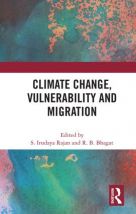Climate Change, Vulnerability and Migration

Climate Change, Vulnerability and Migration explores the impact of climate change on migration, particularly on the socioeconomically poor who are disproportionately vulnerable and bear the worst impacts from climate change-related events. Their heightened vulnerability is due to the prevalence of informal work, precarious land rights, subsistence agriculture, and lack of access to financial instruments and other forms of social protection. The book investigates people’s adaptive capacity and ability to cope with climate change, particularly by exploring the importance of remittances from families to those left behind.
The book is based on papers presented at two international conferences: the National Workshop on Migration and Global Environmental Change in India, organized by UNESCO and Foresight, and the Migration, Care Economy and Development seminar organized by the Centre for Development Studies and Professor K.C. Zachariah. It draws on several field studies from the Indian subcontinent, including India, Pakistan and Bangladesh.
The book discusses the concept of push and pull factors as multi-causal determinants of migration decisions. This includes economic factors as well as several social and political factors, including ethnic and social conflict in areas of origin, and political inclusiveness and migrant integration into the community in the destination area. The book analyses climate change as a driver of migration, particularly through socioeconomic and political drivers such as the loss of income, employment opportunities and livelihoods. However, the environmental factors also overlap and interweave with the economic, social and political drivers. Therefore, the direct effects of climate change on migration are difficult to isolate, measure and predict. Nonetheless, the book argues that migration and remittances from migrants should be understood as part of the adaptive solutions to climate change, as opposed to their negative framing in the mainstream.
Chapter 6 describs the impact of remittances from labour migrants to the Gulf on their recipient families in North-West Pakistan. The study shows an overall positive effect as remittances improved households’ ability to satisfy basic needs, as well as invest in basic amenities, health and education. Remittances were also a fundamental coping mechanism and household economic stabilizer during emergency events such as natural disasters and violent conflicts. They functioned as an insurance mechanism, reducing long-term displacement of the recipient households.
Book Note prepared by Kate Goh
Search the Book notes database
Our Book notes database contains details and summaries of all the publications included in Book notes since 1993 - with details on how to obtain/download.
Use the search form above, or visit the Book notes landing page for more options and latest content.
For a searchable database for papers in Environment and Urbanization, go to http://eau.sagepub.com/

